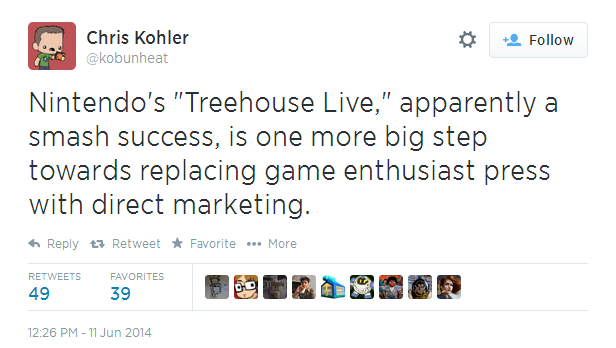
Nintendo Takes E3 Coverage Into Their Own Hands With Treehouse Live
I’ve been watching Nintendo’s E3 presence over the past couple days, and it’s really kind of fascinating. In addition to eschewing the traditional press conference again this year, Nintendo has taken a unique approach both to their digital event and to their ongoing presence at E3. And it signals big changes ahead for how games are marketed by publishers and covered by enthusiast press.
As far as Nintendo’s Digital Event, instead of just showing games (which they certainly did), they decided to give you a look into the creative process with the developers making some of the upcoming games for WiiU and 3DS. The digital event felt almost like a documentary, and really stood out from what Sony, Microsoft and the other big publishers were doing. It didn’t change the fact that most of the games we saw are coming in 2015, but it was an interesting approach nonetheless, and the response to it seems pretty positive overall.
What is much more interesting though is the Nintendo Treehouse, which is basically a continuous stream of interviews and game demos, featuring everything from sit downs with Reggie Fils-Aime to new game reveals to in-depth looks into the changes in the new Super Smash Bros. game. In the course of three days, Nintendo was scheduled to stream over 20 hours of Treehouse Live.
Wired’s Chris Kohler made the astute observation that the positive response to Treehouse Live is another step in publishers replacing enthusiast press with their own direct marketing.

This kicked off an interesting discussion on twitter, which you can read here.
I happen to agree with Kohler’s assessment, and if that is what ends up happening, the gaming media has absolutely no one to blame but themselves.
Currently, the majority of games coverage from enthusiast sites comes in one of two flavors: barely edited press releases and marketing speak that might as well come directly from the publishers themselves (and often does), or jaded fanboy ranting about how everything sucks. And here’s the thing–people are sick of it.
The scary thing for the enthusiast press is that publishers are now starting to refine their marketing approaches to seem a lot less market-y. What Nintendo is doing with Treehouse Live is essentially what you would want any enthusiast outlet to be doing in terms of E3 coverage–bringing on developers to showcase games and talking to them about the development process. With this approach, the outlet providing the best coverage of Nintendo this week is–Nintendo.
And why wouldn’t they take matters into their own hands? Outside of the small amount of praise they’ve received around Mario Kart 8, Nintendo has taken an absolute beating from the gaming media since the original Wii was dubbed a casual games machine. They never got a fair shake with the WiiU, and the constant stream of negativity certainly hasn’t helped their efforts to right the WiiU’s ship. And this is a company who had the best selling console in 2013 with the 3DS. So with their Nintendo Directs and things like Treehouse Live, Nintendo is doing a much better job of controlling their message.
Microsoft already has Major Nelson, but don’t think for a moment they aren’t strategizing how they can take further control of their public perception after the how the gaming media has shredded them since last year’s Xbox One unveiling.
Sony is currently in the good graces of the gaming media, but that could change in a heartbeat (just ask Microsoft).
Make no mistake, the gaming media creates the narrative around the gaming industry and the “console war” the same way CNN and Fox create their own news. Right now, the narrative is that Sony is “winning,” but that Microsoft may have turned a corner with their focus on games at E3. The narrative on Nintendo in the gaming press is that they are finally showing some of the games they need to, but it may be too little, too late.
My long-winded point is this–the enthusiast press is now going to have to justify their continued existence by providing coverage and games discussion that is different from what consumers can get from publishers themselves or message board fanboys. Publishers are becoming more savvy in their use of new media to market their own games and connect with gamers, and Treehouse Live is a shining example of it. If game journalism doesn’t grow up soon, it may become obsolete.
